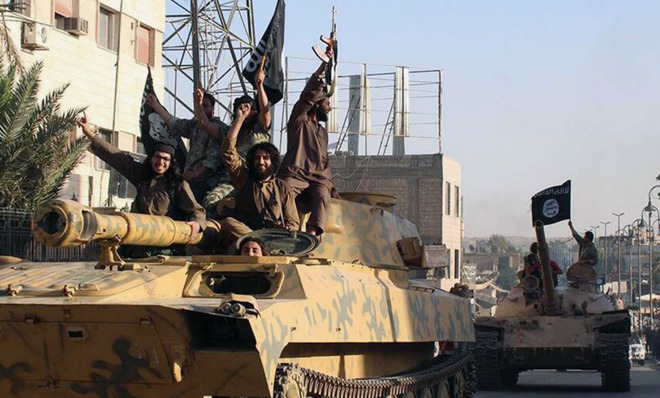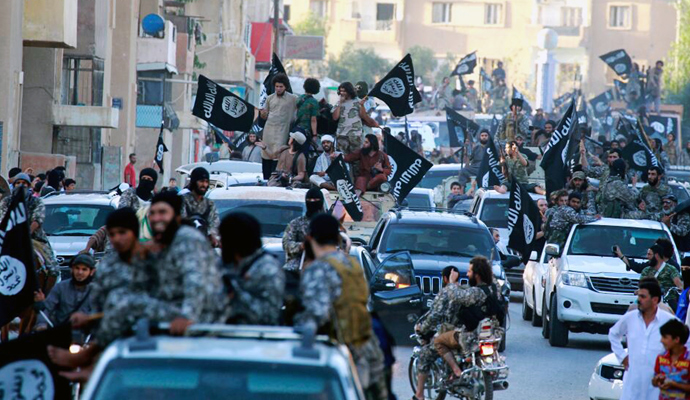Inside ISIS: The making of a radical
He was a bright young Muslim living an idyllic Scandinavian life. What happened to the mind of Abu Tareq?

A free daily email with the biggest news stories of the day – and the best features from TheWeek.com
You are now subscribed
Your newsletter sign-up was successful

The air was melting; it was a boiling October day in Raqqa, Syria, which the al Qaeda splinter group ISIS controls, claiming it as the first province of the Islamic State it is currently carving out of Syria and Iraq.
Abu Tareq was standing in the middle of a roundabout encircling the clock tower of Raqqa; his gaze, like hundreds of gazes, turned toward two black-masked ISIS soldiers. One of the soldiers was reading aloud the verdict of the man between the two of them; his offense was drinking alcohol. Under the burning sun, low-rise buildings glimmered white, contrasting the turquoise-blue sky. Abu Tareq's black T-shirt clung to his body from sweat.
Then fell the lashes — 70 of them, 35 by each of the soldiers — crisscrossing the back of the offender with red stripes. Next came the moment which, to Abu Tareq, epitomizes his first months inside ISIS.
The Week
Escape your echo chamber. Get the facts behind the news, plus analysis from multiple perspectives.

Sign up for The Week's Free Newsletters
From our morning news briefing to a weekly Good News Newsletter, get the best of The Week delivered directly to your inbox.
From our morning news briefing to a weekly Good News Newsletter, get the best of The Week delivered directly to your inbox.
Abu Tareq is the nom de guerre of a statuesque, 23-year-old Dane with Arab-Palestinian roots. We met on the internet, after I found his Facebook profile while looking for devotees of ISIS, widely known as the Islamic State of Iraq and Syria. He requested to use an alias in order to hide his identity from Danish authorities.
After our virtual introduction, Abu Tareq and I met in person this June in Aarhus, Denmark's second-largest city, with 320,000 inhabitants. Abu Tareq had just come back from Raqqa, having spent four months with ISIS jihadists. While in Syria, he told me he studied Islam and worked on humanitarian projects, in addition to fighting with ISIS.
Just a few hours before meeting me, Abu Tareq had changed his hometown on Facebook from Aarhus, where he was born, to Raqqa. Images of black-masked ISIS fighters marched across his profile page.
(More from Narratively: The secret life of a con man)
A free daily email with the biggest news stories of the day – and the best features from TheWeek.com
As the crisis worsens in Syria and Iraq, with fighters splintering into varying extremist groups, the question of what motivates these jihadis often surfaces. Despite fairly generalized portrayals of Muslim extremists in much of the media, a closer look at the individuals drawn to fight for fundamentalist ideals reveals a more prismatic reality.
There are some who have lived their whole lives in Syria, who have watched their houses bombed by Bashar al-Assad's forces and see ISIS as a default option to the regime; there are some who fight alongside ISIS because they have no other source of income; there are some who find solace in the relative order brought by ISIS; there are some who trek from stable democracies, like Abu Tareq did, drawn by the lure of an indefinable utopia.
"When I saw ISIS raising their black flag in northern Raqqa — huge, fluttering in the wind with white signs — I was very sentimental," says Abu Tareq of his first time arriving in Syria in the winter of 2013. "I felt that this is my identity. I don't feel I belong in Denmark."
The toll of this extremism is being measured in fear. Western authorities fear that young men who go to Syria to fight for ISIS and other extremist groups could one day return and commit acts of terrorism on European soil. With the U.S. now actively fighting ISIS in Iraq, some American officials sounded the alarm recently that ISIS may try to launch attacks stateside as well.
And their fears may be justified. Earlier this month The Guardian reported that two British men admitted to joining the extremist organization al-Nusra after returning to Britain from Syria in January. They pled guilty to terrorism offenses and will face trial in London. A French citizen, 29-year-old Mehdi Nemmouche, was indicted for killing four people at the Jewish museum in Brussels in May. Nemmouche spent a year in Syria, and the Kalashnikov that French police found in his backpack was wrapped in an ISIS flag.
(More from Narratively: The kids the Americans left behind)
ISIS, which continued to seize new towns in its sweep across northern Iraq this month — drawing the U.S. military back into the war zone — counts between 7,000 and 10,000 fighters, most of whom are of foreign descent, including many Europeans. German intelligence service Verfassungsschutz estimates that as many as 2,000 Europeans might have joined the fight in Syria since the start of the war in 2011. This is the largest European Muslim foreign fighter contingent in any conflict in modern history. With 100 or more fighters in Syria, Denmark has contributed the highest proportion of its population in Europe.

Danish authorities see this scenario as one of the most sincere terror threats to their country in modern times. In a newly released report, PET, the Danish Security and Intelligence Service, wrote that many of the 100 or more Danes who went to Syria "will represent a threat when they return to Denmark." According to PET, "the [majority] of those who left Denmark have been in touch with groups who have a militant Islamic agenda," primarily Jabhat al-Nusra and ISIS.
Danish intelligence officers estimate there are around 200 to 300 militant Islamists living in Denmark and between 3,000 and 4,000 Danes who sympathize with the extremists' cause.
In November of last year, the first known Danish-born suicide bomber, a blond Muslim convert named Victor Kristensen, blew himself up in an ISIS mission in Iraq. Since then, three other Danish citizens, two of them Danish-Arab and one Danish-Pakistani, have committed suicide attacks for Islamic extremist groups in the Middle East.
"I wish I could become a martyr too," was one of the first things Abu Tareq told me when we met.
Three days before my meeting with Abu Tareq, I had met the aunt of 21-year-old Mouin Abu Dahr, a Lebanese suicide bomber who was radicalized in Denmark and Sweden. Last November, Mouin triggered his suicide belt outside the Iranian embassy in Beirut, killing 23 people.
Breaking her media silence, his aunt and I met in Aalborg, 75 miles north of Aarhus. She did not want her name published.
"My nephew stayed with us in Aalborg for six months before he left for Syria and Lebanon. He was brainwashed," said Abu Dahr's aunt, a voluptuous woman wrapped in a purple dress that matched her nails. "It was shocking to us that he could do such a thing."
Several of Mouin's Lebanese friends described him as "sweet and gentle." According to his aunt, the would-be suicide bomber was "well-liked and popular in Aalborg." He got engaged to be married just months before the suicide mission.
(More from Narratively: Meet the millions of Brazilians battling for shelter)
Putting the tensions into perspective requires a delicate understanding of all sides.
Mustafa Haid, founder and director of Dawlaty, a nonprofit that works with nonviolent activists in Syria, cautions against assuming that men like Abu Tareq were radicalized during their time in the Middle East.
"I understand the concerns of European countries like Denmark. They are afraid of these people coming back to their country and committing atrocities, but also we have concerns as Syrians that these people are already committing atrocities in our country," Haid said in his office in Beirut. "These guys are in Syria committing atrocities against Syrians."
Haid said his gravest concern about representing men such as Abu Tareq as having been radicalized by extremists in Syria or Iraq is that the onus of responsibility is misaligned.
This view is "putting us as somehow suspicious, as if we are the ones who are making these people radicals," explained Haid. "Those people are already radicals. In order for them to decide to come and fight in another country, they've already reached a point [of] ultimate extremism, to abandon everything."
Suicide missions are a central strategy to ISIS's rapid gains in Syria and Iraq, and young foreign men are of value to ISIS because they are often more ardent in their desire to die for the cause than local fighters.
"The foreigners are inspired. They are the most willing to die," says Aymenn Jawad Al-Tamimi, an expert on jihadi groups in Syria and a fellow at the Middle East Forum in Philadelphia. "Ideologically, they are more driven."
Read the rest of this story at Narratively.
Narratively is an online magazine devoted to original, in-depth and untold stories. Each week, Narratively explores a different theme and publishes just one story a day. It was one of Time's 50 Best Websites of 2013.
-
 Nuuk becomes ground zero for Greenland’s diplomatic straits
Nuuk becomes ground zero for Greenland’s diplomatic straitsIN THE SPOTLIGHT A flurry of new consular activity in the remote Danish protectorate shows how important Greenland has become to Europeans’ anxiety about American imperialism
-
 ‘This is something that happens all too often’
‘This is something that happens all too often’Instant Opinion Opinion, comment and editorials of the day
-
 House votes to end Trump’s Canada tariffs
House votes to end Trump’s Canada tariffsSpeed Read Six Republicans joined with Democrats to repeal the president’s tariffs